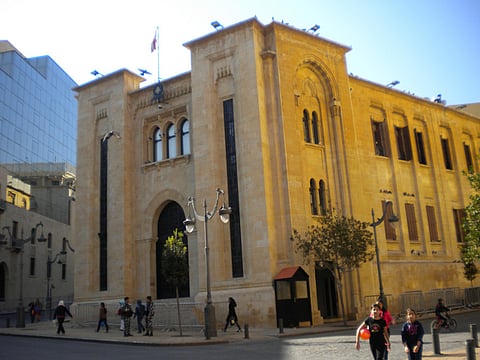Lebanon in a bubble
Elites gear up for a year-long quest to institute a new parliamentary majority

In prescient remarks delivered during an October 1939 radio broadcast, Winston Churchill referred to Russia as a “riddle wrapped in a mystery, inside an enigma”. The British statesman’s definition, which attempted to assess Russian elite behaviour, can easily be juxtaposed elsewhere and seems especially apt for Lebanon, whose elites rely on a tainted but still holding constitution to defend what’s left of its democratic culture. Interpretations vary, but most establishment barons assume that the country is their private property, entrusted to their corrupt care to dispose of as they please. Most derisively dismiss its potential, trample its liberties, and otherwise weaken its sovereignty. How long can the Lebanese continue to live in a socio-political bubble?
For nearly a century, elites who pretended to rule — though limited accountability, mismanagement and false alliances produced chaos, wars and a slew of unprecedented debacles — are now topped by a heavily armed militia and the presence of millions of refugees whose ultimate fate will also define Lebanon’s. Caught in the middle of major regional and international contradictions, leaders routinely flunked various tests, including how best to protect citizens from harm. They consented to, and participated in, the butcheries that introduced the term “Lebanonisation” in contemporary political lexicons to mean “a foundering half-failed state where neighbours fight proxy battles through sectarian militias and through the many factions in a government that is unable to govern at all”, with “times of war when life seems to go on almost as normal, and times of peace when it seems not to”.
Sadly, the Hezbollah militia continues to challenge the state, even if it participates in its theatrical performances. It wants to transform the small country into a more or less permanent revolutionary entity — akin to what Hanoi wished to do in Vietnam against the United States — under specific Iranian guidance. By the very avowal of its representatives, Hezbollah is beholden to the clerics in Tehran, as it unabashedly upholds a divine right to decide for all Lebanese without seeking their consent. It sends young men to die in Syria and elsewhere throughout the Arab World, unaware that such adventures harm Lebanon, and its intrinsic interests.
This vision contradicts those held by other Lebanese, whose socio-political perspectives aim to mimic what Singapore achieved, namely to create a dynamic society where law and order are basic ingredients rather than theoretical goals. They aim to instil liberty across the board and have respect for all ethnic and religious communities. Most deride enigmatic quests for revolution, focusing instead on life and the pursuit of happiness, precisely to enjoy the fruits of a strong economy that encourages the creation of wealth. An overwhelming majority actually believes that the Lebanese can accomplish miracles, collect and recycle their garbage (instead of dumping it in the Mediterranean Sea), provide 24 hours of electricity every day, and otherwise build an efficient infrastructure for the entire country. Most — that is except for wily elites whose very livelihoods depend on the overall chaos that prevails across the board.
After three decades of organised confusion, the enigma is really over the longevity of an entire political class, irrespective of ethnic or religious affiliation. It is safe to say that the real and gargantuan mysteries are the burdens imposed by the political class over Lebanon, along with its citizens’ consent to continue to be ruled by those who clearly fail to devise and agree on what the national interest is, or ought to be. Why have the Lebanese accepted elite pride to weaken every institution? Why have they tolerated and continue to entrust the future of their small nation to those who seldom deliver the most basic ingredients of representative government? Are the Lebanese condemned to perpetually live in a socio-political bubble or will the latter burst on a more or less regular basis as it has in 1952, 1958, 1975, 1982, 1990, 1994, 2005, 2006 and 2008 — all key dates that added to the country’s long-term anguishes?
Never to be underestimated, political elites who recently agreed on a new electoral law based on proportionality — and that divides the country into 15 voting districts to protect incumbents — are likely to embark on temporary investments, to revitalise economic projects as they prepare for the May 2018 parliamentary elections. Few should be surprised by the release of specific development projects to enhance political “purchasing power”, which will ensure re-election. Regrettably, the Lebanese will acquiesce, since such mild promises and investments will dramatically improve conditions over the short-term, though the essential ingredient, liberty, will be left in abeyance. It remains to be determined how long the charade will last so that a majority, that strives for freedom, can eventually triumph.
Dr Joseph A. Kechichian is the author of the just-published The Attempt to Uproot Sunni Arab Influence: A Geo-Strategic Analysis of the Western, Israeli and Iranian Quest for Domination (Sussex: 2017).


